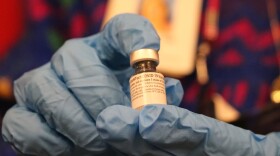The COVID-19 pandemic is being blamed for many people putting off routine medical procedures and screenings. One key concern for health officials is a rise in the number of men not being diagnosed with prostate cancer until they are already in the late stages of the disease.
Prostate cancer is the most common form of cancer affecting men and is nearly 100% survivable if detected early, according to the Arkansas Prostate Cancer Foundation. But Executive Director Chris Collier says since the pandemic began about 18 months ago, the state has experienced a rising number of cases not being discovered until after the cancer is widely spread within the body.
To encourage men between the ages of 45 and 75 to get screened, September is Prostate Cancer Awareness Month in Arkansas. An event kicking off the month was held Wednesday in the Rotunda of the state Capitol.
“Some of the men that we’re now starting to see that are getting screened, and I’ve heard this from a number of urologists around the state, the diagnosis is not only that they might have prostate cancer, but many of them, we’re finding out, are in late stage diagnosis, in other words, stage three, stage four,” Collier said in an interview with KUAR News.
That makes it much more likely that the disease will be fatal, he said.
“Your options are vastly limited when you find the cancer late. It just greatly limits your ability to treat it as effectively,” Collier said.
The American Cancer Society estimates that 1,860 cases of prostate cancer will be diagnosed in Arkansas this year, with 280 men dying from the disease. The risk increases rapidly after the age of 50. Black men are 2.6 times more likely to die from the disease.
Only a sample of blood is needed to conduct a screening, which Collier hopes will help sway men to be tested.
“We’re desperately trying to make people understand that it’s a simple blood draw. This is not a physical examination, it’s literally going and having a vial of blood drawn from your arm, much like you would have any blood work done.”
People can learn more at the foundation’s website.






